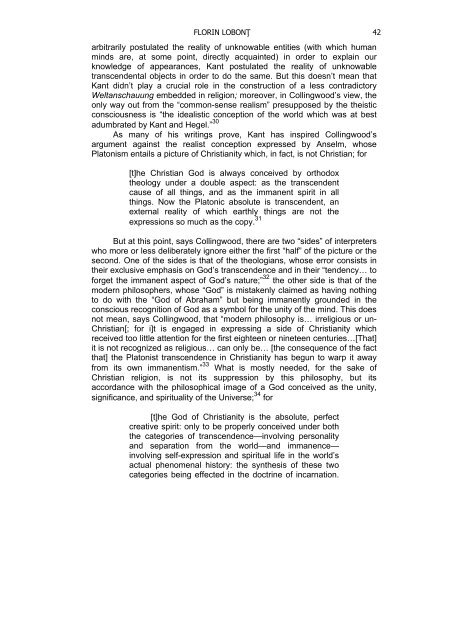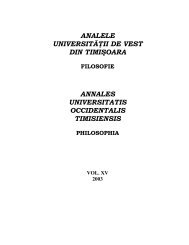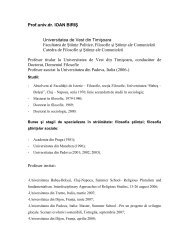VOL. IV (XXI) 2009 - Departamentul de Filosofie si Stiinte ale ...
VOL. IV (XXI) 2009 - Departamentul de Filosofie si Stiinte ale ...
VOL. IV (XXI) 2009 - Departamentul de Filosofie si Stiinte ale ...
You also want an ePaper? Increase the reach of your titles
YUMPU automatically turns print PDFs into web optimized ePapers that Google loves.
FLORIN LOBONŢ 42<br />
arbitrarily postulated the reality of unknowable entities (with which human<br />
minds are, at some point, directly acquainted) in or<strong>de</strong>r to explain our<br />
knowledge of appearances, Kant postulated the reality of unknowable<br />
transcen<strong>de</strong>ntal objects in or<strong>de</strong>r to do the same. But this doesn’t mean that<br />
Kant didn’t play a crucial role in the construction of a less contradictory<br />
Weltanschauung embed<strong>de</strong>d in religion; moreover, in Collingwood’s view, the<br />
only way out from the “common-sense realism” presupposed by the theistic<br />
consciousness is “the i<strong>de</strong>alistic conception of the world which was at best<br />
adumbrated by Kant and Hegel.” 30<br />
As many of his writings prove, Kant has inspired Collingwood’s<br />
argument against the realist conception expressed by Anselm, whose<br />
Platonism entails a picture of Christianity which, in fact, is not Christian; for<br />
[t]he Christian God is always conceived by orthodox<br />
theology un<strong>de</strong>r a double aspect: as the transcen<strong>de</strong>nt<br />
cause of all things, and as the immanent spirit in all<br />
things. Now the Platonic absolute is transcen<strong>de</strong>nt, an<br />
external reality of which earthly things are not the<br />
expres<strong>si</strong>ons so much as the copy. 31<br />
But at this point, says Collingwood, there are two “<strong>si</strong><strong>de</strong>s” of interpreters<br />
who more or less <strong>de</strong>liberately ignore either the first “half” of the picture or the<br />
second. One of the <strong>si</strong><strong>de</strong>s is that of the theologians, whose error con<strong>si</strong>sts in<br />
their exclu<strong>si</strong>ve empha<strong>si</strong>s on God’s transcen<strong>de</strong>nce and in their “ten<strong>de</strong>ncy… to<br />
forget the immanent aspect of God’s nature;” 32 the other <strong>si</strong><strong>de</strong> is that of the<br />
mo<strong>de</strong>rn philosophers, whose “God” is mistakenly claimed as having nothing<br />
to do with the “God of Abraham” but being immanently groun<strong>de</strong>d in the<br />
conscious recognition of God as a symbol for the unity of the mind. This does<br />
not mean, says Collingwood, that “mo<strong>de</strong>rn philosophy is… irreligious or un-<br />
Christian[; for i]t is engaged in expres<strong>si</strong>ng a <strong>si</strong><strong>de</strong> of Christianity which<br />
received too little attention for the first eighteen or nineteen centuries…[That]<br />
it is not recognized as religious… can only be… [the consequence of the fact<br />
that] the Platonist transcen<strong>de</strong>nce in Christianity has begun to warp it away<br />
from its own immanentism.” 33 What is mostly nee<strong>de</strong>d, for the sake of<br />
Christian religion, is not its suppres<strong>si</strong>on by this philosophy, but its<br />
accordance with the philosophical image of a God conceived as the unity,<br />
<strong>si</strong>gnificance, and spirituality of the Universe; 34 for<br />
[t]he God of Christianity is the absolute, perfect<br />
creative spirit: only to be properly conceived un<strong>de</strong>r both<br />
the categories of transcen<strong>de</strong>nce—involving personality<br />
and separation from the world—and immanence—<br />
involving self-expres<strong>si</strong>on and spiritual life in the world’s<br />
actual phenomenal history: the synthe<strong>si</strong>s of these two<br />
categories being effected in the doctrine of incarnation.




